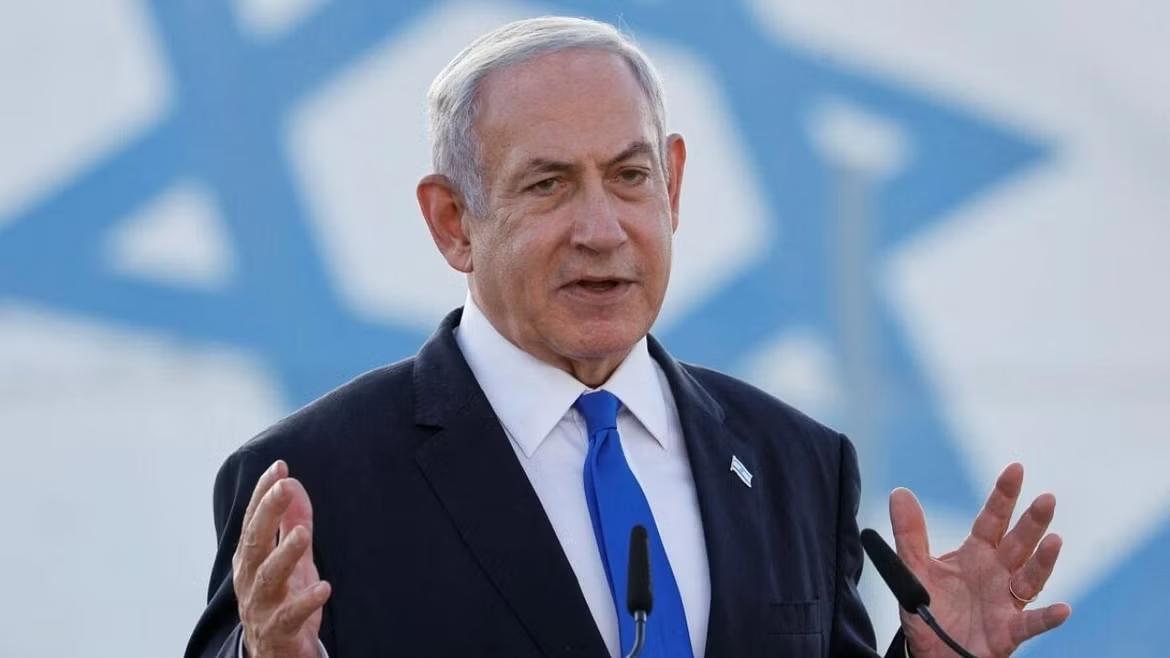Jerusalem: For Israeli Prime Minister Benjamin Netanyahu, confrontation with Iran and its proxies offers the chance of political redemption at home, even at the risk of a regional war, a year after the Oct 7 attack demolished his reputation as a security hawk.
Many Israelis, demoralized by the catastrophic security failures around the deadly attack by Palestinian militant group Hamas, have regained confidence in their military and intelligence apparatus after a series of stunning blows against the Iranian-backed Hezbollah group in Lebanon in recent weeks.
A hate figure for the hundreds of thousands of demonstrators who have joined protests worldwide against Israel's war in Gaza over the past year and a frequent irritant even to his closest ally, the United States, Netanyahu has benefited in his own country.
The death of Hassan Nasrallah, the leader of Hezbollah and a top ally of Hamas, in a Sept. 27 Israeli strike in Beirut was greeted with elation in a country still grappling with trauma from Oct. 7 and a year of war in Gaza that has badly dented its reputation abroad.
Even when a barrage of Iranian missiles sent Israelis piling into bomb shelters last week, Israel's success in intercepting most of the projectiles in coordination with Western allies helped to shore up the country's sense of resilience.
The death of at least nine Israeli soldiers in Lebanon since Israel announced the start of its ground operation on Oct 1 has provided a sobering reminder of the potential dangers ahead.
But Netanyahu, 74, who called Nasrallah's death a "turning point", has led a chorus of statements by Israeli officials in recent days that sought to prepare the population for more war.
"Iran made a big mistake tonight - and it will pay for it," he said at the outset of a political-security meeting after the missile attacks.
Also Read: Israel marks October 7 anniversary under shadow of escalating war
According to a survey from the Hebrew University in Jerusalem, around 80 per cent of Israelis feel the Lebanon campaign has met or exceeded expectations, although the same survey found disappointment with the campaign in Gaza, with 70 per cent supporting a ceasefire to bring Israeli hostages home.
Political survivor
A former member of an elite special forces unit that carried out some of Israel's most daring hostage rescues in the 1970s, Netanyahu has dominated Israeli politics for decades, becoming the country's longest-serving prime minister when he won an unprecedented sixth term in 2022.
His alliance with hard-right national religious parties was key to his victory and he faced some of the biggest protests in Israel's history last year over a package of measures designed to curb the powers of the Supreme Court that drew accusations he was undermining the foundations of the country's democracy. His popularity was further damaged by a trial on corruption charges that he denies.
Since the start of the war, the protests over judicial changes have given way to regular large demonstrations demanding his government do more to bring back the hostages seized by Hamas on Oct. 7, with some protesters suggesting Netanyahu has deliberately kept the war going for his own political ends.
Throughout, Netanyahu has said that only sustained military pressure on Hamas will get the hostages back and he has vowed to continue the war until Hamas is destroyed as a military and governing force in Gaza.
So far, the prime minister has refused to accept personal responsibility for Oct. 7, one of the worst security failures in Israel's history. He has said only that everyone will have to answer difficult questions when the war with Hamas is over, and has dismissed calls to resign and hold early elections.
Outside Israel, he has been the target of protestors outraged by the Israeli military campaign that has laid waste to Gaza and killed nearly 42,000 Palestinians, according to Palestinian health authorities. Foreign governments, including close ally the United States, have been critical of the Gaza campaign and alarmed by the spread of conflict to Lebanon. The International Criminal Court is considering a prosecution request for an arrest warrant against him over alleged war crimes in Gaza, bracketing him with Yahya Sinwar, leader of Hamas, proscribed as a terrorist organization in many Western countries.
At home, while he is one of the most polarising leaders in Israeli history, such controversies have not hurt his image among his base of right-wing supporters.
Netanyahu himself described the move by the ICC prosecutor as "absurd" and said it was directed against the whole of Israel and antisemitic.
Mortal enemy
Before Israel began its escalated campaign against Hezbollah last month, Netanyahu had already seen his domestic political fortunes recover somewhat during a year of a war against Hamas, a group most Israelis, even on the left, see as a mortal enemy.
Recent opinion polls show his Likud party is once again the strongest party in Israel, even if he might still struggle to form a ruling coalition if an election were held now.
He may not need to however, having brought in former ally-turned-rival Gideon Saar last week into his often fractious government, increasing his majority to a comfortable 68 seats in the 120-seat Knesset.
That may give him some insurance against unruly coalition partners like Itamar Ben-Gvir and Bezalel Smotrich, two hardliners from the settler movement who have been consistently unwilling to toe the government line. Having survived being blamed for the worst disaster in Israeli history, he now may even serve out a full term with elections not due until 2026.
—Reuters

